Friday, September 21, 2007
Gone reading
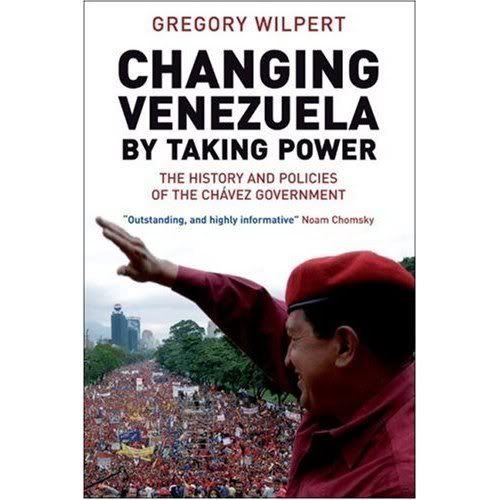
If posting is a tad slow for the next little while you have the above book to blame.
Writing about Venezuela seems to have become a cottage industry lately. Unfortunately, I have yet to find a book, save Charles Hardy's, on the country, either pro or anti Chavez, which I can read more than 20 pages of without getting really annoyed at all the errors, generalizations, and general cheerleading for one side or the other.
Finally, I think there is a book out which may break out of that mold and elevate both peoples understanding of Venezuela and the discussion about it.
It is written by Greg Wilpert who also edits the pro-Chavez web-site Venezuelanalysis. Before our anti-Chavez friends blanch it should be pointed out he has consistently been a very fair minded and analytical person. He is also an academic (PhD in sociology and a former Fullbright Scholar)which leads him to analyse topics both thoroughly and pretty objectively (especially by the standards of discusssions on Venezuela where things often quickly degenerate to name calling). He has always been willing to acknowledge the shortcomings of the Chavez led government. Therefore this book should not just be silly pom pom "Chavez is the greatest thing since sliced bread" track.
Interestingly, the end of the book has an appendix dedicated to discussing what XXI Century Socialism is supposed to be and how it would be different from other political and economic systems because as the author points out Chavez himself never says. Half way through it I can say while I don't agree with everything it is both thorough and VERY interesting. It can definitely serve as the basis for many an interesting discussion.
It will probably be some time before I finish the book and am able to write any worthwhile critique of it but I already think it would really help the discussions on the this blog if others read it.
It's in bookstores already in the U.S. so you all now have your assigned reading.
UPDATE
Oh yeah, I forgot to mention I'm reading this one too:

As you can see I am going to be busy this weekend. So no-one better write any more fucking books on Venezuela. And if they do, well they'll just have to take a number. Seriously, if Venezuela could get the royalties from all these books on Chavez it might be able to give up its day job of exporting oil. Jeeze.
|
Tuesday, September 18, 2007
Impeccable leftist credentials?
Personally, I've never been sold on his leftist credentials. Yeah, he was supposedly a communist back in the 1950s and 1960s. Later he was in the Venezuelan congress as a member of the moderately leftist MAS party. Later still he was a minister in the Caldera government where he finished his movement across the political spectrum by implementing a tough austerity program.
Even though he was a low paid government official the financial gods somehow smiled upon him (don't even think it - he couldn't possibly have been corrupt, could he?) and he was able to wind up with his very own newspaper, Tal Cual. It's not really what most people would think of in terms of a newspaper as it doesn't have much news. Its sparse pages are almost exclusively dedicated to attacking the Chavez government.
In one concession to the traditional communist style of editing papers though the front page doesn't contain news. Rather it is always an editorial written by I think you can guess who.
Anyways, it turns out this man with "impeccable leftist credentials" isn't actually so nice to work for. Currently the distributers of his paper are annoyed that they don't actually get any benefits - you know, like vacation time, health care, pension payments, etc.
A "leftist" screwing his workers by not giving them benefits?!?!?! Well before you panick, it really isn't that bad. See, as Petkoff points out these people aren't really employees. They are independent contractors and the relation between them and Tal Cual is one of employee to employer but rather is a strictly commercial relationship. And in fact now he is getting rid of them all by turning over the distribution of the paper to another rightwing opposition paper, El Universal, and firing all the existing workers (though he argues they aren't fired because they never worked for him in the first place). Of course, Petkoff wants to pay them next to nothing in severance pay even though many have worked with the paper its entire seven year history.
What is the saying - "With friends like this who needs enemies?".
I guess with "leftists" like this, who needs right wingers?
BTW, for the workers point of view watch this.
|
Monday, September 17, 2007
They are just now figuring this out?
Sheikh up
Sep 13th 2007
From The Economist print edition
BY BOOSTING their output of oil for the first time in two years, the members of the Organisation of the Petroleum Exporting Countries this week finally signalled that the oil price, at nearly $80 a barrel, has gone high enough. This time last year, by trimming its output, OPEC indicated that it did not want the price to fall below $60 a barrel. Will the cartel be able to keep the oil price confined between this lofty floor and even higher ceiling—and if so, what is the outlook for the world's energy supply from OPEC's new penthouse?
Abdullah al-Badri, OPEC's secretary-general, explained that the group had decided to open the taps at its summit in Vienna out of compassion for cash-strapped drivers around the world. “Our message to consumers is that we care,” he told the press corps. But consumers who recall the earlier part of this decade, when the price vacillated between $20 and $30, are presumably not overwhelmed by the cartel's compassion.
The difference between now and then is OPEC's discovery that booming places like China have a seemingly unquenchable demand for oil. Oil producers, including those in OPEC, struggled to keep up. Prices rose, but demand kept on increasing too. By last summer, OPEC was already pumping as much oil as it could, and markets were fearful that hurricanes in the Gulf of Mexico or a political storm in the Persian Gulf would lead to shortages. The oil price duly rose to over $77 a barrel.
When those fears dissipated, it became clear that there was enough oil to go around after all. But by then, OPEC had developed a taste for $70 oil. So it cut production to stop prices from falling too far. When the oil price reached a new record of $78 a barrel last month, it was thanks as much to OPEC's diminished output as to runaway demand. The cartel has now proved that it has enough discipline to prop up prices by restraining supply if need be, and also enough spare capacity to temper prices when they rise too high for its liking. In other words, OPEC is back in control of the oil price.
This contains a grain of good news. Had a Katrina-like hurricane or a conflict between America and Iran destroyed lots of rigs last year, there would have been no one capable of compensating for the lost production by pumping more. Now, at least, oil consumers can go cap in hand to the likes of Saudi Arabia, as Samuel Bodman, America's energy secretary, did before the OPEC meeting.
But for all Mr al-Badri's magnanimous talk and Mr Bodman's pleading, do not expect OPEC to grant the world's drivers much respite. Several of its members, including Algeria, Iran and Venezuela, argued against higher quotas on the grounds that global financial jitters and an incipient economic slowdown in America might lead to lower demand for oil, just as OPEC was increasing supply. In the end, the cartel resolved to raise its output by only 500,000 barrels per day, or less than 2%, although the increase comes in addition to the 900,000 b/d its members are already pumping in excess of their quotas. The extra supply did not dent the price at all; in fact, the oil price hit new records following OPEC's announcement.
Ignorance of the law
That should worry OPEC's hawks more than it appears to. They seem to think that the world economy's ebullient growth over the past few years in the face of rapidly rising oil prices proves that it has developed immunity to oil shocks. The Chinese economy, for one, consumes more oil relative to its size than America's, but it is still galloping along. Americans, for that matter, show no inclination to buy less petrol even at prices over $3 a gallon.
Yet the laws of economics have not suddenly been repealed. Dearer oil will cut economic growth. Over the longer term, consumers respond to higher prices by driving more efficient cars and substituting other fuels for petrol. America's romance with gas-guzzling sports-utility vehicles appears to be fading and its affair with biofuels is ever more passionate. At the same time high prices are bound to constrain demand, and unpredictable economic growth and Middle Eastern politics make the future of both demand and supply uncertain. OPEC may appear to have regained control over the oil price, but it's not likely to last.
They are just now figuring out that a disciplined cartel of major producers can effectively control oil prices?!?!?!?!?! Maybe they had to spend the last 8 years studying at the London School of Economics to figure this out? Or maybe they just learned the hard way after at the beginning of this year making the silly prediction that Venezuela was reaching the "bottom of the barrel" as oil prices were likely to decline?
Regardless they could have just asked Chavez years ago and he would gladly have explained to them the importance of OPEC and how as long as there weren't major quota busters in it (read: the Venezuelan opposition running Venezuela) OPEC could effectively control prices. He sure knew better. When the corrupt old management was destroying PDVSA and destroying Venezuela with their corrupt and self-serving desire to ramp up production and bust quotas he saw right through it:
If you want a good reason or two why OPEC is on its last legs, talk to Luis E. Giusti. Few executives have done more to change the global oil industry outlook than the 54-year-old president of Petroleos de Venezuela (PDVSA), the second-largest oil company in the world. Since 1990, Giusti has spearheaded an ambitious policy to open the state-owned monopoly to private companies and to ramp up oil production.
Giusti sold the opening-up despite deep-rooted nationalistic opposition to such a move. He accomplished this by making it a significant part of a broader vision for assuring Venezuela's future as a strategic global oil supplier. His aim: to double production over the next 10 years, to around 6 million barrels daily. Garrulous and candid, Giusti mobilized support with a campaign of talking to ministers and politicians, lobbying congressional committees, making speeches, and writing articles. Today, dozens of foreign companies are drilling in Venezuela's prolific oilfields.
While fears are increasing that economic distress will lead to backsliding from free-market policies, Giusti's reforms in the oil industry are likely to survive any backlash--and to serve as a successful benchmark for oil openings that are under way in other countries such as Brazil.
Populist former coup leader Hugo Chavez, the front-runner in Venezuela's presidential election campaign, promises to fire Giusti and to ''review'' the deals with foreign companies.
Chavez was true to his word, immediately fired Giusti, survived a PDVSA manager strike and... here we are with oil selling for almost 10 times what it sold for before Chavez came to office (btw just for laughs read this where Caldera's energy minister said that Venezuela should not respond to low prices by cutting production - thank god he got fired too!). The people who write for the Economist might not know much about the economics of oil, but thankfully Chavez does.
Of course, the sad reality is despite all the empirical evidence of the past 8 years most of the Venezuelan opposition doesn't get this. Rest assured if Borjas, Rosales, Petkoff, or any of the other clowns were president Venezuela would be back to its quota busting ways, its government would be broke, and oil would be somewhere south of $20 per barrel.
|
Sunday, September 16, 2007
Gone shopping
Gone are the days when it was actually exiciting to blog about Venezuela and show nice pictures of city mayors cheering on rock throwers.
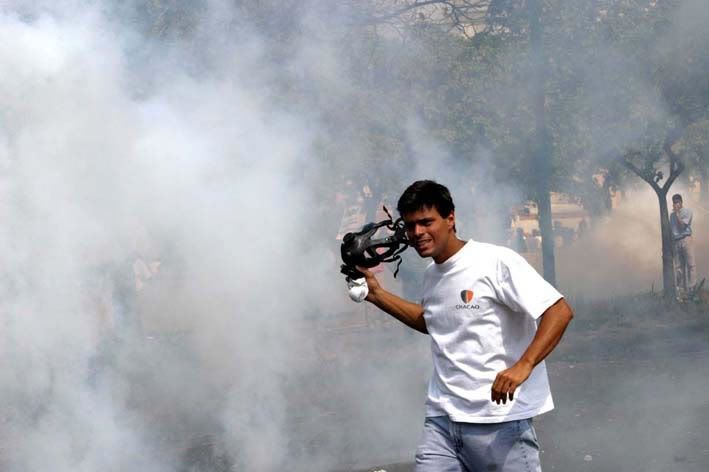

Just looking at these pictures gets my blogger blood flowing. Yes, those were the days!
Gone too are the exiting days of opposition mass political rallies. Now they are nothing more than memories and pictures carried around by a handful of old women.
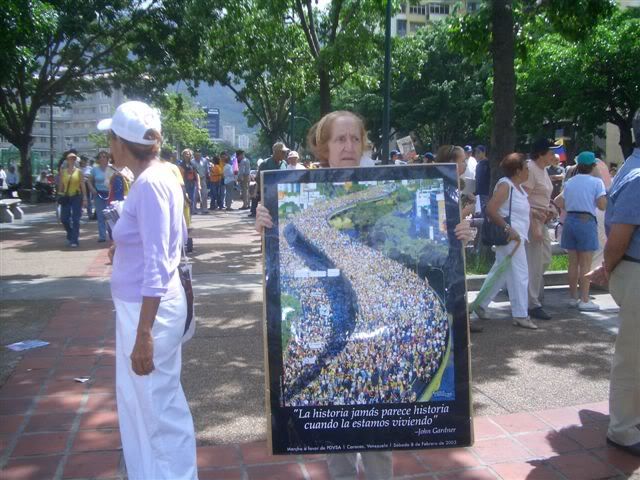
So what happened? Where did everyone go? To the shopping malls as it turns out.
According to todays El Universal sales in Venezuelan shopping malls are up 30% already this year and the shopping mall association is hoping they will be up 45% by year end. If you can't beat 'em you can at least go shopping with them I suppose.
Of course, to the casual observer this makes complete sense. Travelling around Venezuela you can't help but notice all the jam packed new shopping malls.
There is nice little one in Maracay with a spiffy new attrium:

Why to tropical places where you see palm trees everywhere put them in their malls too? Shouldn't it be malls in the tundra of Canada that do stuff like that to try to perserve some sanity amongst their residents?
And in Barquisimeto the malls are packed as we can see in this picture of Las Trinitarias mall:

Even though they just added a second level to that mall it is still overcrowded. So they had to build a another big mall on the other side of town:


Yet that is still not sufficient to hold all the people who want to go around shopping for new appliances, flat screen TVs, or the latest fashion. So now they are having to bring in the heavy weights - the Sambil which is now going up on the east side of Barquisimeto:
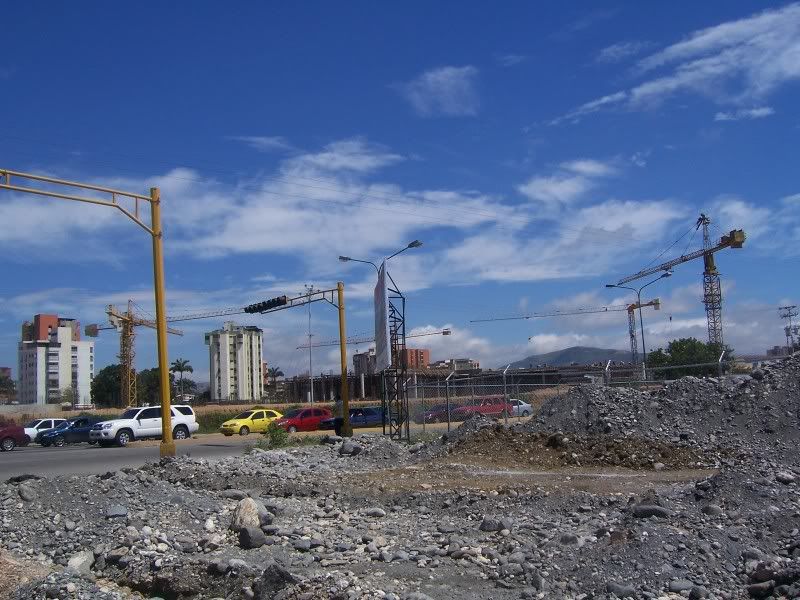
These construction cranes are only on the Sambil site. But driving around eastern Barquisimeto I counted more than a dozen. Being a crane operator would seem to be a good job these days in Venezuela.
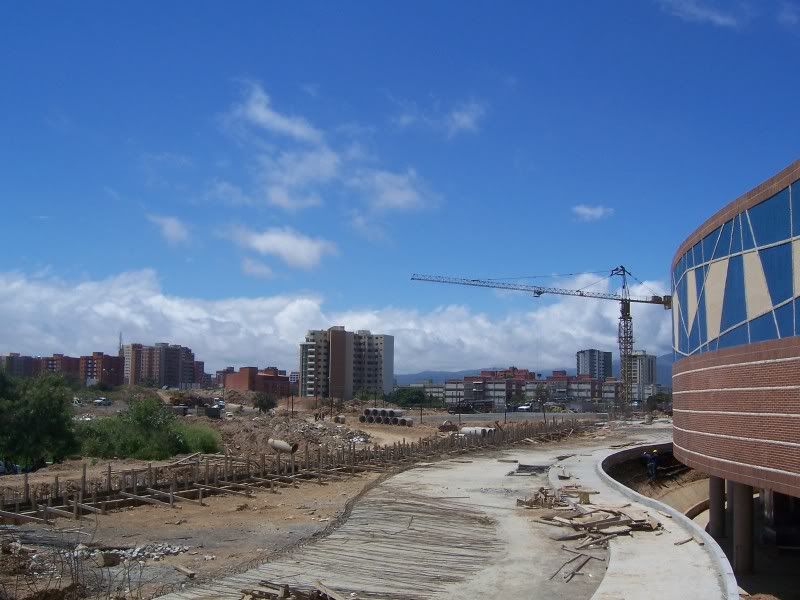

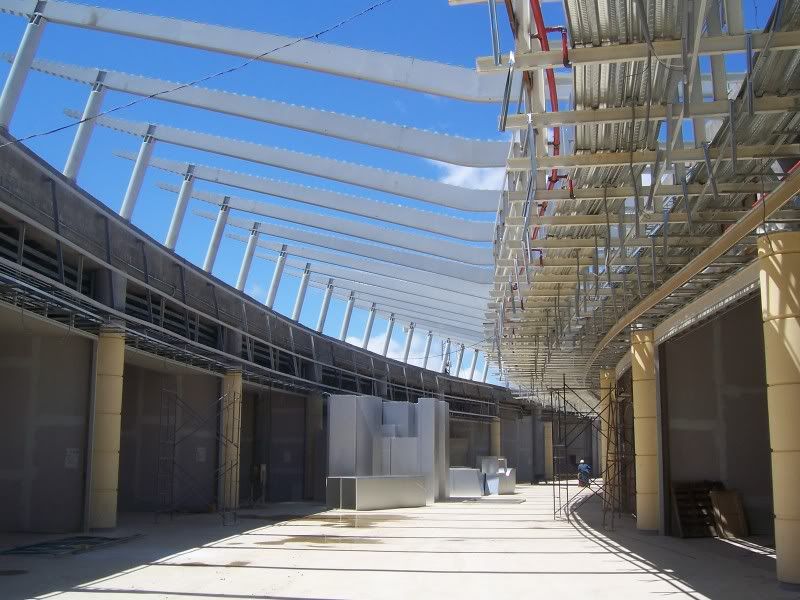
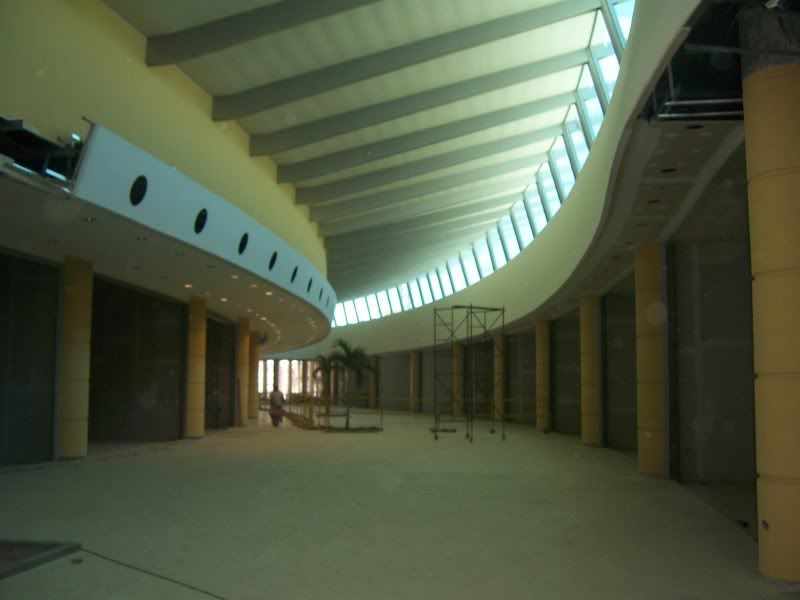
But even this gigantic guitar shaped shopping mall isn't expected to be enough. They are already clearing space to build yet more malls right next to it!!
What is creating this shopping frenzy that risks undermining Chavez's goal of a new socialist Venezuelan and instead create a country full of Valley Girls? Two things.
First, a lot more Venezuelans have jobs. In fact, in the past year alone a stunning 416,000 new jobs (even though some idiots are upset it didn't create even more jobs?!?!?!?). More jobs means more people with money to spend - that is pretty simple.
Second, Venezuelans have been getting BIG raises. Much bigger than most people in fact. With double digit growth in purchasing power not only are more Venezuelans working, but all of those workers have much more disposable income. That in turn drives them to the mall - in their spiffy new cars no less.
Where this huge consumer binge will ultimately lead and whether it is even such a good thing is a whole other discussion. But the point remains - it is making Venezuela pretty damn boring. I mean really, would anyone go out to a big shopping mall in the U.S. and blog about that?
Put simply, this prosperity might be great for real Venezuelans, but for bloggers it sucks. I swear to god, if consumption goes up another 10% next year I don't think I'll be able to even get out of bed in the morning, much less blog.
|
No kidding
I am saddened that it is politically inconvenient to acknowledge what everyone knows: the Iraq war is largely about oil
Its nice to hear someone acknowledge that I didn't screw up in naming this blog.
Of course, if he wanted to be completely truthfull he'd also say about the only reason anyone in Washington D.C. even knows where Venezuela is results from it having, um, oil.
|
